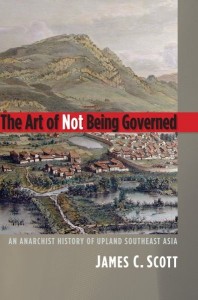
I’ve finished a careful reading of James C. Scott’s really fascinating, deeply insightful (and occasionally oddly not-very-insightful) book The Art of Not Being Governed: An Anarchist History of Upland Southeast Asia. I’ll be reviewing it shortly.
I also read a few other books lately, including Malcolm Gladwell’s really fun Outliers: The Story of Success. His writing is so elegant and enjoyable that you have to catch yourself and not be swept away into his conclusions just because of the sheer pleasure of the reading. (I was not convinced of several of his points, notably the discussion of the relationship between intelligence, achievement, and “threshold effects,” especially on pp. 77-90. He might be right, but I was not convinced. The other material on the role of sheer luck in having access to opportunities, however, was quite persuasive.) Another very pleasurable book on luck that I’ve been reading in little bits of down-time standing in lines and the like (but haven’t finished yet) is Nassim Nicholas Taleb’s Fooled by Randomness: The Hidden Role of Chance in Life and in the Markets.*
Besides some other works I’m working through, I’m hoping to get through Ian Carter’s A Measure of Freedom, which should be helpful for a project on the development of metrics of liberty.
*I admit that I bought the Gladwell and Taleb books from a street cart in Shanghai. I rather suspect that they are pirated editions, which I find dodgy, so I considered (for a few seconds) sending small payments to the authors and to their publishers, but decided instead that I’d buy clearly non-pirated editions in the US.










Ian Carter was a student of Hillel Steiner, and, in A Measure of Freedom, tries to counter Steiner’s essentially zero-sum view of changes in the distribution of freedom.
Dear Dr. Palmer,
In light of the final note in your post, I wonder whether you changed your attitude towards intellectual property compared to this article http://tomgpalmer.com/wp-content/uploads/papers/morallyjustified.pdf
As for James Scott, I happened to read his another anti-statist book “Seeing Like a State: How Certain Schemes to Improve the Human Condition Have Failed”.
It struck me how he viewed the market in almost the same negative light as the state. His main grievance against both the state and the market seems to be that both entail a degree of standardization.
Thanks, Daniil,
Yes, Scott’s view of markets is quite odd, for the reason you mention and others. I find it puzzling. (And he has a rather romantic view of life among village people that I also find odd.) But more about that soon.
On the intellectual property issue, I have never said that people ought to go around copying the works of others, just that the moral foundations for punishing copying are very weak and not persuasive and that there are other forms of incentives for creators. Most of the varied claims for the efficiency or the justice of intellectual property are offered, in my opinion, without much argument. That said, I make an effort not to take copyrighted software from the internet, download copyrighted songs for free, take credit for what other people have created, or buy books for which authors expect royalties they won’t get from me. So after I bought those two books from the street vendor (really good copies, too!), I read them in Asia, and then bought copies from book sellers in the US.
I agree. I also think that in many situations I would not use intellectual products of others for free, but I would not like that approach to be dictated to everyone by law.